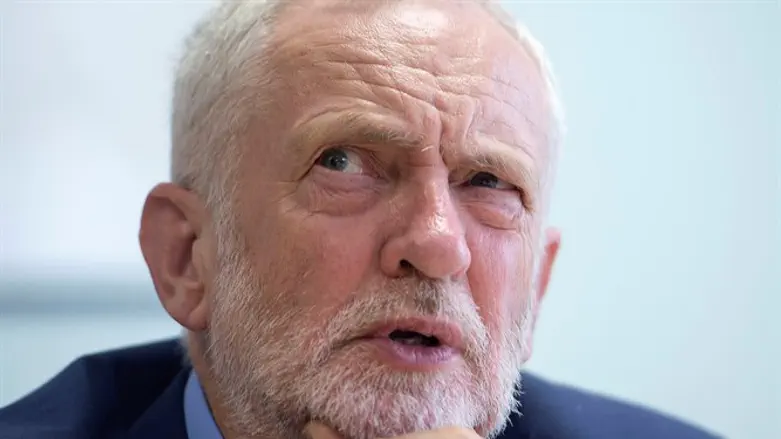
British Labour leader Jeremy Corbyn on Friday sought to clarify remarks he made in 2013 when he accused a group of Zionists of having “no sense of English irony”, despite “having lived in this country for a very long time”.
The Daily Mail published a clip of Corbyn’s comments earlier this week. In it, he was heard telling attendees at a London conference that “Zionists … clearly have two problems. One is they don’t want to study history, and secondly, having lived in this country for a very long time, probably all their lives, they don’t understand English irony either. They needed two lessons, which we could perhaps help them with.”
The conference, which was promoted on the Hamas terror organization’s English language website, featured several controversial speakers, including one who had advocated boycotting Holocaust Memorial Day and another who blamed Israel for the 9/11 attacks.
In a statement issued on Friday night and quoted by The Guardian, Corbyn said he had used the term Zionist “in the accurate political sense and not as a euphemism for Jewish people.”
“I am now more careful with how I might use the term ‘Zionist’ because a once self-identifying political term has been increasingly hijacked by anti-Semites as code for Jews,” he added.
Corbyn also insisted he had “defended the Palestinian ambassador in the face of what I thought were deliberate misrepresentations by people for whom English was a first language, when it isn’t for the ambassador.”
In his remarks, Corbyn praised a speech he had heard by Manuel Hassassian, the Palestinian Authority (PA) envoy to Britain, at a meeting in parliament in which the envoy gave an “incredibly powerful” account of the history of “Palestine.”
Corbyn then added, “This was dutifully recorded by the, thankfully silent, Zionists who were in the audience on that occasion, and then came up and berated him afterwards for what he had said.”
After the video was posted on Thursday, Corbyn was condemned by some of the Labour MPs who have been particularly critical of his record on anti-Semitism.
Luciana Berger, the parliamentary chair of the Jewish Labour Movement, tweeted: “The video released today of the leader of @UKLabour making inexcusable comments – defended by a party spokesman – makes me as a proud British Jew feel unwelcome in my own party. I’ve lived in Britain all my life and I don’t need any lessons in history/irony.”
Labour MP Mike Gapes said he was in “total solidarity” with Berger and that he was “sickened by the racism and anti-Semitism at the top of our party”.
A spokesperson for the Labour leader said meanwhile, “Jeremy is totally opposed to all forms of anti-Semitism and is determined to drive it out from society. At this event, he was referring to a group of pro-Israel activists misunderstanding and then criticizing the Palestinian ambassador for a speech at a separate event about the occupation of the West Bank.”
The 2013 video is the latest in a series of controversies to have plagued Corbyn in recent weeks.
The Labour leader, who has been accused by senior UK Jewish leaders of holding anti-Semitic views, has come under fire in recent years for calling Hamas and Hezbollah his "friends" and for outright refusing to condemn those two terrorist organizations despite being urged to do so by local Jewish groups.
Just last week, the Daily Mailpublished photos of him at a cemetery in Tunisia holding a wreath near the graves of some of the Palestine Liberation Organization (PLO) terrorists who were responsible for the massacre of the 11 Israeli athletes at the 1972 Munich Olympics.
Days later, a picture emerged of Corbyn apparently making a salute linked to the Muslim Brotherhood organization.
Also last week, the Times of Londonpublished a picture of Corbyn meeting with the leader-in-exile of the Popular Front for the Liberation of Palestine (PFLP) terrorist organization, only weeks before its members carried out an attack on a Jerusalem synagogue in which six people were murdered.
This week it was revealed that Corbyn attended a conference with a convicted Hamas leader who was jailed in Israel for his role in orchestrating a string of terrorist attacks that killed more than 100 people between 2001 and 2002.
In addition, dozens of Labour members have been suspended over their anti-Semitic statements in recent years, and the party has been criticized for its failure to deal with the anti-Semitism within it.
(Arutz Sheva’s North American desk is keeping you updated until the start of Shabbat in New York. The time posted automatically on all Arutz Sheva articles, however, is Israeli time.)